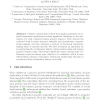Free Online Productivity Tools
i2Speak
i2Symbol
i2OCR
iTex2Img
iWeb2Print
iWeb2Shot
i2Type
iPdf2Split
iPdf2Merge
i2Bopomofo
i2Arabic
i2Style
i2Image
i2PDF
iLatex2Rtf
Sci2ools
RECOMB
2008
Springer
2008
Springer
Reconstructing the Evolutionary History of Complex Human Gene Clusters
Abstract. Clusters of genes that evolved from single progenitors via repeated segmental duplications present significant challenges to the generation of a truly complete human genome sequence. Such clusters can confound both accurate sequence assembly and downstream computational analysis, yet they represent a hotbed of functional innovation, making them of extreme interest. We have developed an algorithm for reconstructing the evolutionary history of gene clusters using only human genomic sequence data. This method allows the tempo of large-scale evolutionary events in human gene clusters to be estimated, which in turn will facilitate primate comparative sequencing studies that will aim to reconstruct their evolutionary history more fully.
Computational Biology | Downstream Computational Analysis | Present Significant Challenges | Primate Comparative Sequencing | RECOMB 2008 |
Related Content
| Added | 03 Dec 2009 |
| Updated | 03 Dec 2009 |
| Type | Conference |
| Year | 2008 |
| Where | RECOMB |
| Authors | Adam C. Siepel, Eric D. Green, Giltae Song, Tomás Vinar, Webb Miller, Yu Zhang |
Comments (0)

